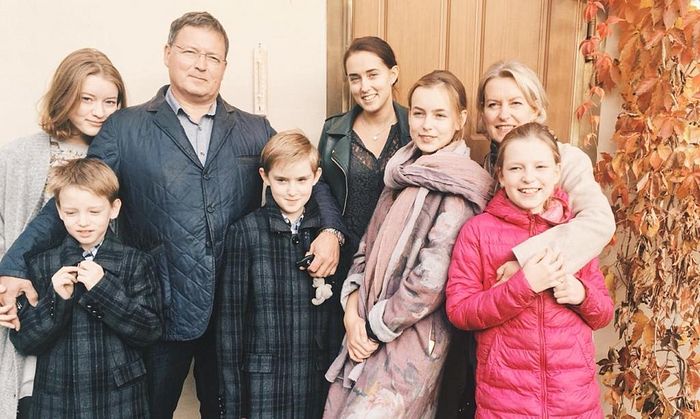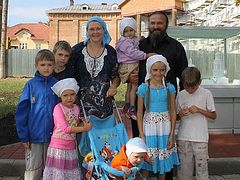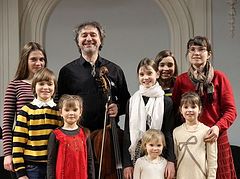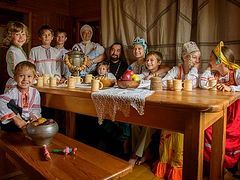There are six children in the Postovalov family, and it is a miracle: during each pregnancy the doctors would tell Elena that her organism was unable to bear a baby. But each time, the couple was ready to take risks out of love for their children. And, according to Elena, if it were not for her ill health they would have had twice as many children.
The parents:
-
Maxim Valentinovich, fifty-two, a civil engineer;
-
Elena Mikhailovna, forty-nine, a civil engineer.
They have been married for twenty-six years.
Their children:
-
Daria, twenty-five, an Aeroflot flight attendant;
-
Xenia, nineteen, a second-year student of St. Tikhon’s Orthodox University of Humanities (PSTGU);
-
Sophia, fourteen, a seventh grader;
-
Maria, eleven, a fifth grader;
-
Pyotr, ten, a third grader;
-
Ivan, eight, a second grader.
Maxim Valentinovich speaks:
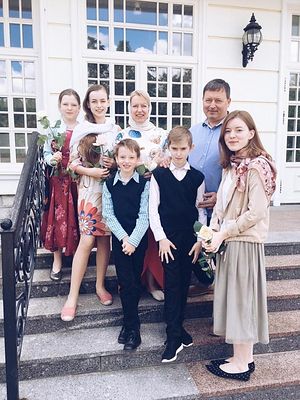 The Postovalovs We have invented special answer for people around us who wonder why we have many children. This is how we would always answer their puzzled questions: “We have so many children because we want a boy. I am the last male representative of our family, so we needed boys to prevent the family from dying out, but we had many girls in a row.” Everybody was satisfied with this explanation, they did not ask any more questions, and we hid behind a convenient excuse. From the standpoint of formal logic, everything in the world should be planned, but it just doesn’t work that way. It is the Lord that plans our lives, and we just surrendered to the Divine plan.
The Postovalovs We have invented special answer for people around us who wonder why we have many children. This is how we would always answer their puzzled questions: “We have so many children because we want a boy. I am the last male representative of our family, so we needed boys to prevent the family from dying out, but we had many girls in a row.” Everybody was satisfied with this explanation, they did not ask any more questions, and we hid behind a convenient excuse. From the standpoint of formal logic, everything in the world should be planned, but it just doesn’t work that way. It is the Lord that plans our lives, and we just surrendered to the Divine plan.
As a rule, the main reason behind married couples’ disinclination to have children is financial issues. The parents’ fear that they won’t be able to set several children on their feet is a mere cliché and not real life circumstances. Who defines how much a child needs, and by what criteria his needs should be assessed? People who are the closest to me would say, “Why bring paupers into the world?” This was not up for discussion—it was a declaration. Where is the borderline between sufficiency and insufficiency? Our children are well fed, clad and shod, they go to both music school and art school. And it is a matter of the parents’ efforts and not a matter of finances. Are the parents ready to make sufficient efforts to manage everything? If they are, then I believe their children will have all they need.
Consumerism gives the illusion of fulfilment and satisfaction. It is a simple way of filling one’s life, whereas a deep fulfilment requires much effort, time and imagination. I simply pray to God, I thank Him for the things I have, the things I don’t have, or things I have lost. The word “fate” [sud’ba in Russian.—Trans.] means “God’s judgment”. This is my cross. My family, my home, my nearest and dearest, and my health are far more important than material prosperity and comfortable circumstances.
The State doesn’t support us in any way. The only support we have ever received as a large family is the Muscovite’s parking permit. Although getting the documents took two months instead of the ten days prescribed by law. A failure of the electronic system occurred, and I had to pay my parking fees for those two months. This is not to say that I suffered a great loss, but I was not happy.
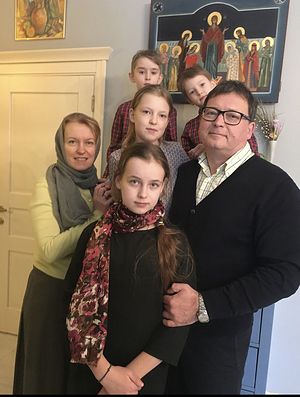 I don’t have any particular principles for upbringing children. They are born with their own personalities. No matter how parents raise them, children will grow up and make their own choices. Every single human being has his own understanding of how he should live in this world. True, we can make decisions for our children, but I don’t think this will serve as a guideline for them. Their worldview is formed by what they see in their families and the values they live by. Children make conclusions based on their environment and live in this context. In our family the values are very simple: There are the Lord’s commandments, there is the fear of God; and I think that’s all.
I don’t have any particular principles for upbringing children. They are born with their own personalities. No matter how parents raise them, children will grow up and make their own choices. Every single human being has his own understanding of how he should live in this world. True, we can make decisions for our children, but I don’t think this will serve as a guideline for them. Their worldview is formed by what they see in their families and the values they live by. Children make conclusions based on their environment and live in this context. In our family the values are very simple: There are the Lord’s commandments, there is the fear of God; and I think that’s all.
Are our children always glad to go to church? Even adults sometimes don’t want to get up early because they are too lazy. In this situation the parents have two options: either to use their authority or to let the children decide for themselves whether or not they want to go to church. Our children just get up and go. It is done without any constraint—they just do what all the other family members do.
I don’t punish my children. I don’t want to say that I am against punishments, but my children never do anything that deserves a punishment. As a rule, peace and unity reign in our family. My wife Elena and I haven’t had any serious conflicts either. Although sometimes we do have different opinions on some matters, that is good because each one of us has his own point of view. A conflict begins when you don’t listen to the other person. I personally listen to my other half and can make concessions.
Our circle of acquaintances mainly consists of large families, so that is a norm for our friends. We don’t feel that we have been performing a podvig because a large family is absolutely natural. This is precisely what a genuine family is like. There is almost no room for egoism in it—though it may be extremely difficult for you to swallow your pride and suppress your desires, you have to have regard for those around you.
Children learn to be responsible for their actions from infancy. Of course, there may be sibling jealousy and rivalry in large families, and even if the children “pull the blanket on themselves”, the blanket is pulled from the opposite side as well; thus children learn to compromise. And, in the long run, the relations in a large family grow into a competition—who will show more kindness and love.
Elena Mikhailovna speaks:
 When I first saw Maxim I thought: “Here is the man who will become the father of my son”. We studied at the same institute, but he was several years my senior.
When I first saw Maxim I thought: “Here is the man who will become the father of my son”. We studied at the same institute, but he was several years my senior.
I was always an A student, knew English and Spanish, and began to work while studying. At that time cooperatives were mushrooming out, so I worked for a prestigious Spanish company for some time. An opportunity for me to go for practical training and make my career in Spain presented itself. But at that very moment Maxim proposed to me. I chose family over a career—something that my father still cannot forgive me for. He said that I had buried myself and my talents. But the thought has never crossed my mind over these years that “It was so stupid of me to do so! I should have chosen the career!” It appears that my mission is to be a wife and a mother.
I was a very obedient daughter. My parents had told me just before I got married: “One or two children would be enough! And then just enjoy your life.” And I would have followed their advice but for my acquaintance with Zhenya [a diminutive form of the name Eugenia.—Trans.]. While our toddlers were playing in a sandbox, we were sitting near them and reading the book, Preparing for Confession. We became friends, and one day Zhenya said, “Why should we stay at home doing nothing? Let us have more children!” I agreed. Now I have six children, and she has eight. But what would I have done if I hadn’t met Zhenya? I think the Lord would have found another way of setting me on this path.
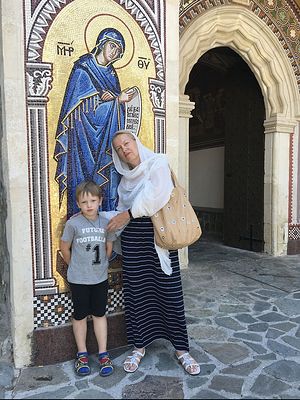 I have always had health issues. But I was introduced to Elder Iliy (Nozdrin) at Optina Monastery, so I would chase after him asking, “Bless me to give birth to a child! The Lord has not given me a baby so far.” He would laugh: “How many children do you want?” I would answer, “Father, I want to have a boy!” Every time the doctors saved my life they would say, “According to our medical indications you cannot have children. Your body is just not adapted to bearing children. It is a mystery how you manage to bear them!” So I am a “difficult case”. Two of my children were born prematurely, and I once almost died during labor. Each child is a miracle. Of course, someone might ask, “Why take such risks with our lives?” The answer is very simple, “Such is my love for children. I love my children to distraction. If it were not for my age and poor health, I would have twice as many children.”
I have always had health issues. But I was introduced to Elder Iliy (Nozdrin) at Optina Monastery, so I would chase after him asking, “Bless me to give birth to a child! The Lord has not given me a baby so far.” He would laugh: “How many children do you want?” I would answer, “Father, I want to have a boy!” Every time the doctors saved my life they would say, “According to our medical indications you cannot have children. Your body is just not adapted to bearing children. It is a mystery how you manage to bear them!” So I am a “difficult case”. Two of my children were born prematurely, and I once almost died during labor. Each child is a miracle. Of course, someone might ask, “Why take such risks with our lives?” The answer is very simple, “Such is my love for children. I love my children to distraction. If it were not for my age and poor health, I would have twice as many children.”
The difference between bringing up boys and bringing up girls is as different night and day. I wondered why the Lord didn’t give me the boys first, when I was young and full of energy? I am very fond of needlework—knitting and sowing… That is my favorite hobby. And the girls would always join me in doing needlework. But when the boys appeared we needed to run, shoot toy guns with them etc., and by that time I had far less energy! You can’t entertain boys with knitting or sowing! It would seem that if the Lord had first sent us the boys and then the girls, our life would have been easier.
Fortunately the Lord blessed me with obedient children. They understand that they are doing something wrong before I have time to frown at them. Whenever my children do a lot of mischief, I become sad and fall silent.
And while I am melancholy, they group up on me, “Oh, mom…” Whenever a deadlocked situation arises, I call the “children’s council” and ask them what I ought to do. Sometimes all the children concur, but sometimes I hear six different opinions and have to turn to my husband. The mind of a man is very clear, so Maxim finds a quick solution to any problem. And we have no conflicts between us.
I can usually talk with my husband late in the evening. He comes home from work late, and we can sit and talk for an hour or two in the kitchen, when the children are already in their beds. This joy of talking or watching a movie together in the evening is really indispensable. And on weekends we all try to go to the park, the zoo, or the cinema together. I wouldn’t be able to spend my vacation without the children—I would be bored to death. Once before going on vacation I asked grandmother to look after the boys in my absence and took the girls with me. But the vacation turned out to be sheer torture: I felt restless and didn’t know what to do with myself. I said to myself: “I will never split up my family on vacation again.”
I am responsible for household chores in our family. As high school students, my two oldest daughters began to help me a lot about the house. It was at that time that after a long interval between pregnancies (I was sick for a long time) I gave birth to several more babies. My elder daughters would wash them up, sit in, feed them, and read them tales. Now both of them are grown-up and even support us financially. Though she is still studying at PSTGU,1 our second daughter Xenia tries to find temporary jobs in summer to support the family. Our oldest daughter, Daria, graduated from The Military University, became a lawyer, and fulfilled her girlhood dream of flying. She became an Aeroflot flight attendant and a year later she said to us: “I will probably become a pilot.” I replied: “Daria, you should marry and have children!” She would be happy to have her own family and children, but there are no potential fiancés around. Both my oldest daughters want to marry, but the guys they know only seek “free relationships”. In my view, over the past few years the moral values in our society have dramatically changed for the worse.
The oldest girls began to go to a music school but eventually gave up. Xenia still sings. With their school choir ensemble they would go to international music competitions, returning with gold and silver medals. Now both Daria and Xenia regret not having obtained a musical education. That is why I insisted that the youngest children take music lessons—one of the sons is learning the guitar and the others are learning the piano. They also take art lessons and make toys with clay.
My children recently met a boy who has no siblings. They came home wide-eyed. “Mom, he is the only child in the family! He must be bored stiff!” The children understand that there is concord and a lot of fun in a large family. Every time I was pregnant I thought despite my ill health, “Oh, the next pregnancy should be much more complicated since I am feeling so awful now!” That is, I was thinking about the next baby before the birth of the current one—it’s a zeal for childbearing. It’s a happiness that cannot be bought for any amount of money.

